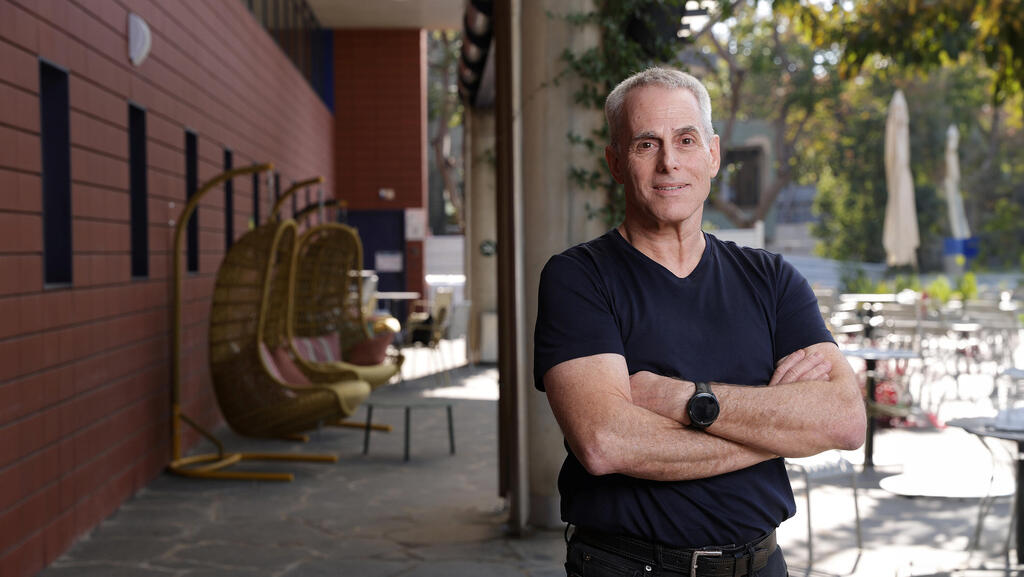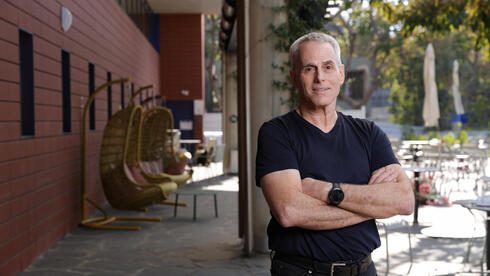At the entrance to Applied Materials Israel’s General Manager Rafi Benami’s office are landscape photos of Alaska, New Zealand and Mount Kilimanjaro taken during his travels around the world. One of the photos shows four feet in hiking boots atop a mountain in New Hampshire’s White Mountains National Park, symbolizing the long journey he and his son have taken together. Another photo shows breathtaking views from the Milford Track in New Zealand, taken during a post-military trip with his daughter. This theme of “travel” is Benami’s life philosophy and management approach. His personal journey to lead a 2,000-employee organization in Israel that has doubled in size over the past three years under his leadership began 12 years ago.
Applied Materials is a publicly traded company that employs tens of thousands of people around the world and specializes in chip manufacturing processes. The Israel subsidiary focuses on machinery and quality control products for chip manufacturing and is the company’s largest R&D and manufacturing center outside the United States. Benami took on the role of general manager in early 2022, during the twilight of the tech boom, but has since come under intense demands. It is a global crisis, on top of Israel’s chaotic judicial reform and a long war that has lasted more than a year.
1 View gallery


Rafi Benami
(Photo: Orel Cohen)
You took office at the peak of the growth of Israel’s high-tech industry, and now everything is different. How did you spend these tumultuous three years?
“There is a storm brewing in Israel, and we are dealing with it as business owners in a difficult environment. However, our business is shaped by the global situation in the semiconductor industry, a global technology hub. Demand for AI and automotive chips is expected to grow by 50% in the semiconductor industry by 2030, and we operate in an environment with very optimistic forecasts. .
“Additionally, Applied Global has significantly increased its investment in our company. Since 2021, we have nearly doubled our workforce and financial investment in our Israeli office. We currently have three buildings This growth reflects our confidence in the direction of the industry and the future of the company, but we also believe that the challenges at the national level are significant. It’s big. ”
On October 7, Benami drove his son, who is in an elite military unit, to the military, then convened a business continuity forum for the company to implement a non-disruptive contingency plan. The war had a huge impact on the company. Applied Israel lost four employees, including veteran Yehuda Cohen, whose son Nimrod Cohen was kidnapped and taken to Gaza. Since the war began, 15% of the company’s employees have been drafted into the reserves, with up to 300 employees serving at any one time. To address the labor shortage, Applied Materials Israel reached out to retired employees and asked them to temporarily return and expanded its facilities.
The company rented an entire hotel in the industrial area of Rehovot to house the families of its employees from war-affected areas such as the Gaza border area. We provided financial assistance to families whose homes were damaged and emotional support to employees who were dealing with traumatic events.
Do you think Applied Materials’ global management may eventually lose patience with the situation in Israel?
“The bottom line is no. Applied has invested heavily in Israel for many years and I was able to persuade the CEO to increase that investment even further. Since October 7th, we have We have proven to both management and our customers what we can do.”Despite the initial concerns, we have continued to provide machines and support without interruption, even in these difficult circumstances. I did.
“Our global management team, based in Santa Clara, California, has gone from concern to confidence as they watch us seamlessly maintain our operations. One of the main reasons is that in October Even before the 7th, we were building our business as a global company. This global balance, with a strong core in Israel, complemented by strong teams in India, Germany and close to our customers. , to maintain business continuity during difficult times.”
So, have some of your activities moved overseas?
“We have not moved our operations overseas; we have diversified our operations. This global diversification helps us reduce risk. That said, we continue to hire locally. , we have over 80 positions open in Israel across technology fields such as physics, software, and algorithms.”We are hiring for a similar number of roles around the world, and we are looking for this balance and building a strong core here in Israel. This is why we were able to successfully navigate this difficult environment. ”
Mr. Benami lives in Ramat Gan with his wife, Professor Orli Sadeh, Dean of the Faculty of Business Administration at Hebrew University, and their two children. His journey with Applied Materials began more than a decade ago after holding positions at global technology companies such as Comverse and NICE. Looking back on her early days at the company, Benami admits it wasn’t “love at first sight.”
You mentioned that it’s a difficult company to integrate. why is that?
“This is due to the complexity of our work. We work with a wide range of technologies, each of which requires deep expertise. These technologies can be integrated while meeting specific customer needs. You need a passion for learning and a constant commitment to succeed here.” Coming from NICE, a software company, I had to dive deep into a completely new technology. That was a challenge. ”
Throughout your career, you have climbed the corporate ladder. Do you have any tips for succeeding in large organizations?
“First, you need to be great at what you do, but that’s not enough. Collaboration is key. You can’t accomplish anything alone. You’re only as good as your partner, so foster win-win collaboration.” It’s also about balance.” A broad view of the system, combined with the ability to see details on demand, is critical to moving large organizations forward. ”
Are you working in a hybrid model? Does it make collaboration difficult?
“Since the pandemic, we have adopted a hybrid model of two to three days in the office. Hybrid work has its benefits, but interpersonal interaction is irreplaceable. A new office will be built in October to increase The long-standing relationships built here over the years have helped us maintain collaboration, even in a hybrid environment, but ultimately, we’ll never be able to work together face-to-face. Some of the intangible benefits of doing so will be lost. ”
The Applied Materials Israel office feels more like an industrial factory than a typical Israeli high-tech workspace. Despite operating at the forefront of chip technology, the company produces physical products, unlike many software-focused companies.
How is the current high-tech job market impacting your company?
“Fortunately, we continue to be an attractive place to work during the high demand period of 2021-2022. Recruiting is easier now, but we will always maintain diversity in our recruitment.” This approach creates a healthier and more innovative organization.”
What do you predict for Israel’s high-tech industry in 2025?
“The current situation in Israel is damaging the country’s high-tech industry. For Israel to prosper, it needs stability. People and capital must move freely in and out of the country. Unfortunately. , Israel’s ‘brand’ is being tarnished.Social cohesion and common values” are essential to high-tech success, but they are now under threat.
“We have been successful at Applied Israel because we have built a core of strong values that foster acceptance and collaboration. This foundation allows us to build a healthy and productive company. . This is something that all of Israel urgently needs to take back.”

